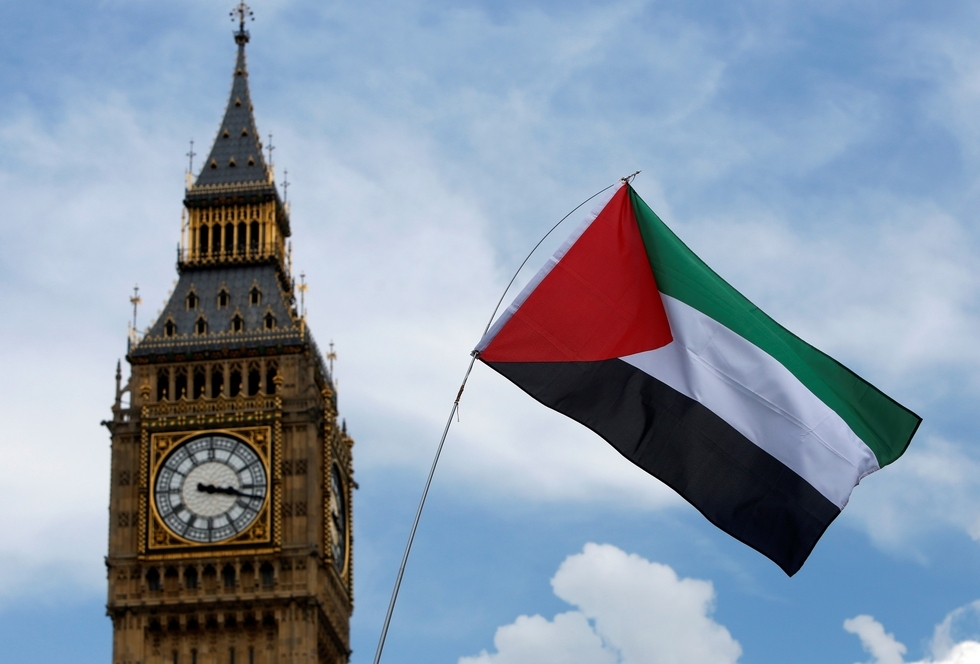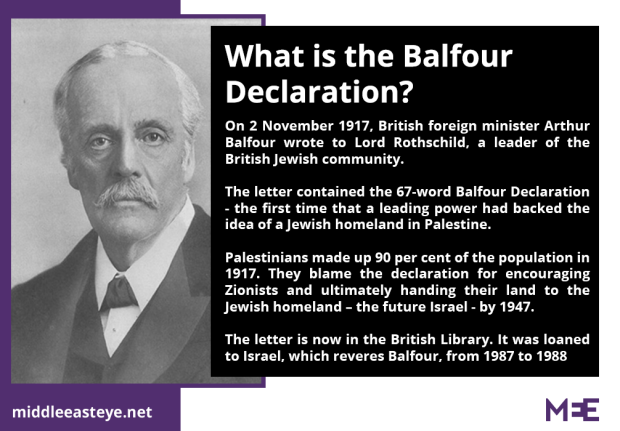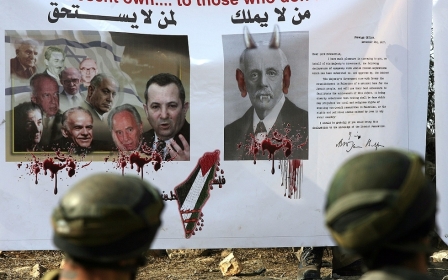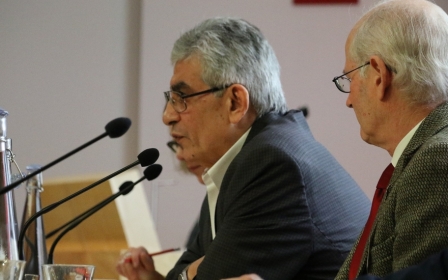Britain broke its promise to the Palestinian people - on Balfour's centenary it should make amends

Just over two weeks from the 100th anniversary of the Balfour Declaration on 2 November, all parties are readying their narratives for the impending public opinion battle ahead.
Jews largely see the Balfour Declaration as a defining moment leading to the creation of the state of Israel, while for Palestinians it is when their country was just promised away over their heads, violating the second part of the declaration that "nothing shall be done which may prejudice the civil and religious rights of existing non-Jewish communities in Palestine".
Palestinians from the leaderships to the popular level rail against the British government's attitude on the Balfour Declaration. Palestinian President Mahmoud Abbas has for two years demanded an historic apology from Britain. His foreign minister threatened to sue Britain in a statement at the 2016 Arab League summit.
It is one issue that unites all Palestinians. Britain is fair game to blame.
Shades of censorship
Determined to engage the British public on Balfour, the Palestinian Mission in London attempted to place adverts, which it had paid for, about the Balfour Declaration and subsequent Palestinian losses on the London Underground network and buses as part of what it called the "Make it Right" campaign.
Transport for London (TFL) banned the adverts on the grounds that they were "politically controversial" and “did not comply fully with our guidelines".
The Palestinian Ambassador in London, Manuel Hassassian, issued a furious riposte to the Guardian newspaper accusing TFL of censorship, proclaiming that "there may be free speech in Britain on every issue under the sun but not on Palestine".
Remember that this is not the US where political advertising is a mega industry, protected as free speech under the first amendment
At face value, both have a point.
TFL's rules state that political campaigns and adverts cannot be used on the underground nor adverts that would arouse controversy. The Balfour Declaration is every bit as politically controversial today, as it was when the then British Foreign Secretary, Arthur Balfour, issued the pledge a century ago.
Remember that this is not the US where political advertising is a mega industry, protected as free speech under the first amendment. In Britain - for example - political advertising is banned on television, a decision that was upheld by the European Court of Human Rights in 2013.
The TFL rulebook certainly does not appear to allow for such adverts.
Consistency issues
If it was the other way round, and the Israeli embassy paid for an advert celebrating the Balfour Declaration, Palestinians would be rightly demanding it be blocked under exactly the same rules. But perhaps where TFL should be questioned is on the issue of consistency? Whether an advert is political or controversial is ultimately a matter of judgement. This does not explain why TFL allowed a similar advert to run for two weeks at Westminster tube station for last November's 99th anniversary.
That too was part of the "Make it Right" campaign. Has something happened to change TFL's position or did it make a mistake?The Russian channel Russia Today (RT) has recently taken out adverts on the tube ridiculing widespread accusations that it is a propaganda channel. TFL said that it adhered to its guidelines, yet RT is certainly controversial and few believe it is anything but a political tool of the Kremlin.
Hassassian also makes a powerful point on the issue of censorship and the lack of debate. University debates on this issue are frequently cancelled. Those who dare to support the Boycott, Divestment and Sanctions campaign (BDS) become the target of attacks by government ministers and the anti-Palestinian groups that refuse to recognise Palestinian rights.
Fears of false accusations of anti-Semitism hold many back from saying what they think about Israeli government actions and policies. Elected politicians from all parties have told me this on many occasions.
Seize the moment
That the Palestinian viewpoint does not get a hearing in the plush corridors of Whitehall is one reason why advertising space on the underground has seen fearsome debates before. Only in February 2016, activists plastered trains and walls with posters accusing Israel of apartheid and the media of being biased in an unauthorised flyposting campaign.
Moreover, who can blame Palestinian officials for fulminating against a British government whose prime minister is still determined to celebrate Balfour with "pride". Theresa May might have an acceptable position if she ever balanced this by expressing regret, that while Balfour did prove positive for the Jewish people, it was an horrific disaster for the Palestinian people and its effects are ongoing today.
The solution is to render this advert obsolete with one simple decision. Britain should recognise Palestine now
The real shame is that the debate over Palestine has been driven underground. The mainstream media typically avoids the issue. British cabinet ministers only seem to appear at Israeli-friendly or anti-Palestinian events. Boris Johnson took months after taking over as Foreign Secretary before he dared say anything on the issue.
The Balfour anniversary could be just such an opportunity if only there was a politician with sufficient guts and clout minded to seize the moment.
The solution is to render this advert obsolete with one simple decision. Britain should recognise Palestine now. Perhaps then we could have an advert on the underground promoting tourism to the state of Palestine. One day this might not even be controversial.
-Chris Doyle is the director of the Council for Arab-British Understanding. As the lead spokesperson for CAABU and as an expert on the region, he is a frequent commentator on TV and radio, and gives numerous talks around the country on issues such as the Arab Spring, Libya, Syria, Palestine, Iraq, Islamophobia and the Arabs in Britain.
The views expressed in this article belong to the author and do not necessarily reflect the editorial policy of Middle East Eye.
Photo: Demonstrators carry Palestinian flags as they protest outside the Houses of Parliament in central London on 26 July 2014 (REUTERS/Luke MacGregor)
Middle East Eye propose une couverture et une analyse indépendantes et incomparables du Moyen-Orient, de l’Afrique du Nord et d’autres régions du monde. Pour en savoir plus sur la reprise de ce contenu et les frais qui s’appliquent, veuillez remplir ce formulaire [en anglais]. Pour en savoir plus sur MEE, cliquez ici [en anglais].







